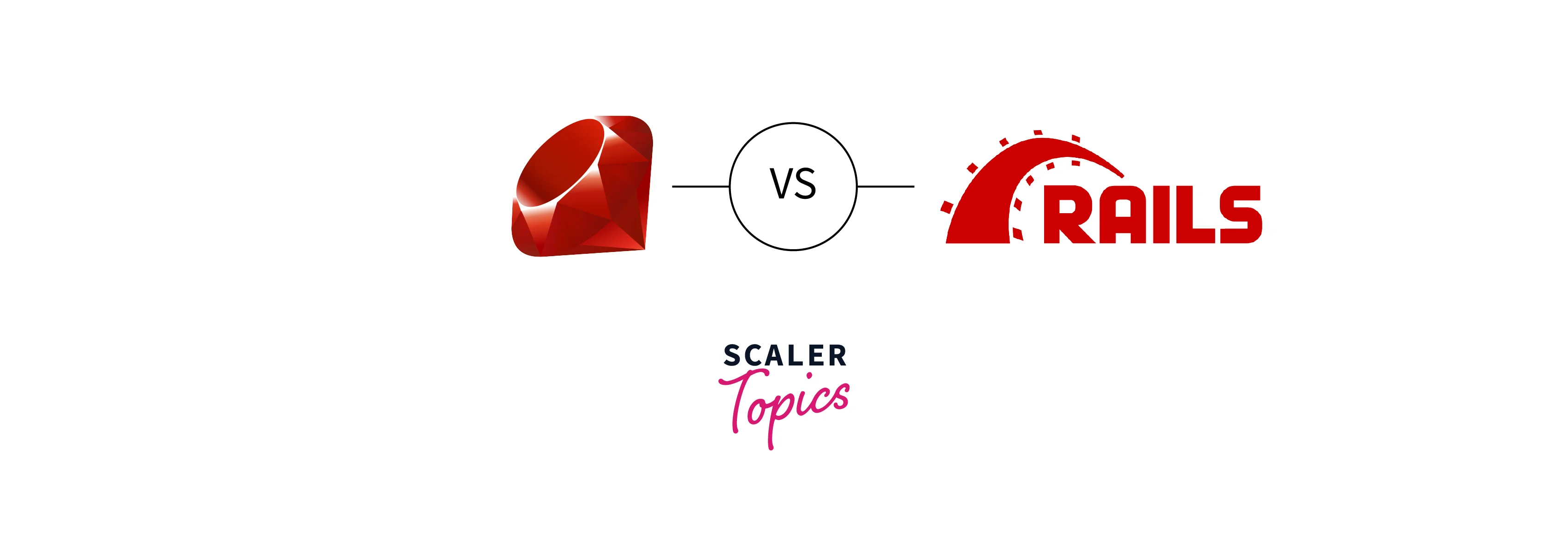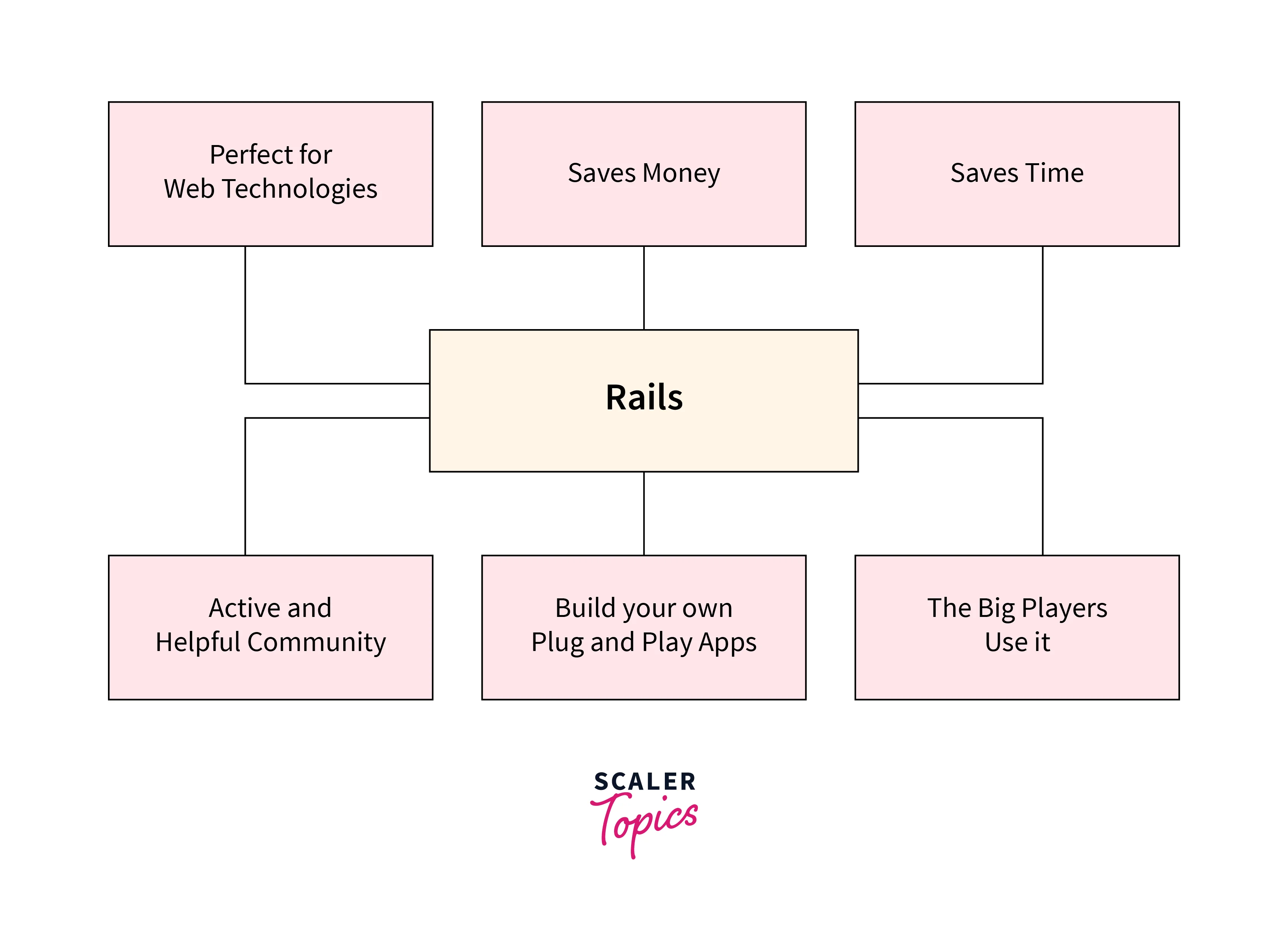Ruby Vs Ruby on Rails: What are the Main Differences?
Overview
Ruby Ruby on Rails are two popular terms in the world of programming, often used interchangeably. However, they are not the same thing. In this article, we'll explore the main differences between Ruby and Ruby on Rails, their advantages, features, and applications, which help us decide which one to choose for our projects.

What is Ruby?
Ruby is a flexible and easy-to-understand programming language.
Advantages of Ruby
- Expressive syntax: Ruby's syntax is easy to read and write.
- Object-oriented: Ruby supports reusable and modular code.
- Dynamic typing: Ruby allows us to change variable types during development.
- Metaprogramming: Ruby has powerful capabilities for modifying code.
Features and Applications of Ruby
- Scripting language: Ruby is used for automating tasks and writing command-line utilities.
- Web development: Ruby can be used with frameworks like Ruby on Rails, Sinatra, and Hanami.
- Prototyping: Ruby is great for quickly building proof-of-concept applications.
- Automation and testing: Ruby is suitable for automating tasks and writing test scripts.
What is Ruby On Rails?
Ruby on Rails, or Rails, is a powerful web application framework written in the Ruby programming language.
Advantages of Ruby on Rails
- Productivity:Rails makes developmentfaster by following conventions.
- MVC Architecture: Rails organizes code to make it easier to maintain and test.
- Developer-friendly: Rails has an easy-to-understand syntax for clean code.
- Rich ecosystem: Rails has many libraries and plugins for easy integration.

Features and Applications of Ruby on Rails
- Database integration: Rails works seamlessly with databases.
- Routing: Rails has a powerful system to define URLs and actions.
- Automatic code generation: Rails provides generators for quick code creation.
- Testing framework: Rails includes tools for writing tests.
- Scalability: Rails offers features for handling high traffic and large datasets.
Ruby on Rails is commonly used for building web applications like e-commerce sites, social networks, and content management systems.
A Programming Language Vs a Framework
To understand the differences between Ruby and Ruby on Rails, it's essential to grasp the distinction between a programming language and a framework. A programming language, such as Ruby, is a set of syntax and rules that allow developers to write code. It provides the foundation for building software applications.
On the other hand, a framework, like Ruby on Rails, is a collection of pre-written code libraries, tools, and conventions that help developers streamline the development process. A framework builds on top of a programming language and provides a structure for organizing and implementing code.
In the case of Ruby on Rails, it leverages the Ruby programming language and extends its capabilities by providing a set of predefined rules and conventions for building web applications.
Ruby vs Ruby on Rails: Comparative Analysis
To better understand the differences between Ruby and Ruby on Rails, let's compare them side by side:
| Ruby | Ruby on Rails |
|---|---|
| Programming language | Web development framework |
| General-purpose | Specifically designed for web development |
| Requires manual configuration | Emphasizes convention over configuration |
| Lower learning curve | Steeper learning curve due to the framework's complexity |
| Flexible and dynamic | Opinionated and follows a set of predefined conventions |
| More control over implementation details | Abstracts away implementation details, providing higher-level abstractions |
| Suitable for small to medium-sized projects | Suitable for both small and large-scale web applications |
| Requires additional libraries or frameworks for web development | All-in-one framework for web development |
| Greater flexibility but requires more effort for setup and configuration | Faster development cycle but with less flexibility |
Which One to Choose?
When choosing between Ruby and Ruby on Rails, consider the following points:
- Specific Needs and Project Requirements:
- If we require a general-purpose programming language with flexibility and control over implementation details, Ruby is a suitable choice. It excels in scripting tasks, automation, and prototyping.
- If our primary focus is web development and we desire a framework that offers conventions, productivity enhancements, and a rich ecosystem, Ruby on Rails is a compelling option. It streamlines development, promotes code consistency, and provides web-specific features.
- Project Complexity and Timeline:
- For smaller to medium-sized projects, Ruby's flexibility may be advantageous, as it allows us to have more control over implementation details.
- For projects with tight timelines or larger-scale web applications, Ruby on Rails' structured approach and built-in features can expedite development.
- Scalability Needs:
- If our project requires scalability and handling high traffic, Ruby on Rails offers built-in features like caching, background job processing, and support for distributed systems.
- Development Team Expertise:
- Consider the expertise and familiarity of our development team with Ruby and Ruby on Rails. If they are more experienced with Ruby or have a preference for a specific technology, it can influence the decision.
FAQs
Q. Can we use Ruby on Rails without knowing Ruby?
A. While it is possible to use Ruby on Rails without in-depth knowledge of Ruby, having a solid understanding of the Ruby programming language will greatly enhance our ability to work with the framework effectively.
Q. Is Ruby on Rails the only web development framework for Ruby?
A. No, Ruby on Rails is the most popular and widely used web development framework for Ruby. However, we can explore other frameworks like Hanami and Sinatra based on our specific requirements.
Q. Is Ruby or Ruby on Rails better for beginners?
A. Ruby is often considered more beginner-friendly due to its expressive syntax and simplicity. However, learning Ruby on Rails can also be rewarding as it introduces us to web development concepts and best practices.
Conclusion
- Ruby: Dynamic, object-oriented language with flexibility and simplicity. Suitable for scripting, automation, and small to medium-sized projects.
- Ruby on Rails: Web development framework emphasizing convention over configuration. Boosts productivity, provides built-in features, and suits both small and large-scale projects.
- Ruby offers flexibility and a lower learning curve, while Ruby on Rails abstracts away implementation details for code consistency.
- Choose based on project requirements, scalability needs, and team expertise.
